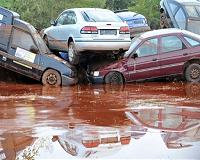| . |  |
. |
Budapest (AFP) Oct 11, 2010 A new dam being built around a ruptured reservoir to divert a new wave of toxic sludge from swamping already devastated villages in western Hungary should be ready late Monday, authorities said. "The new dam is 70 percent completed" and should be finished on Monday evening, the head of the disaster relief services, Tibor Dobson, told AFP. Hundreds of volunteers, disaster relief teams and engineers have been racing against time since Saturday to erect a new dam around a reservoir of chemical residue, which authorities feared could crumble if rain arrives as forecast later this week. The containing walls of the reservoir already broke a week ago, sending a tidal wave of toxic sludge through the surrounding villages, killing at least seven people and polluting an area of 40 square kilometres (15.4 square miles), as well tributaries of the Danube. Kolontar was the village worst hit by the disaster and its entire population of nearly 1,000 people have been forced to evacuate while the threat of a new spill remains. "Construction work is going ahead. There were no unforeseen hick-ups overnight," Dobson said. Contrary to previous information, the new dike -- which measures 30 metres (98 feet) wide and four metres high -- would not be 400-500 metres in length, "but around 1,500 metres," the official continued. Some 1,050 metres were already completed. The vast majority of evacuees -- aside from the 24 people who refused to leave -- spent Saturday night with family or friends, and about 50 people stayed in a sports centre in the nearby town of Ajka. By Sunday, the number of people who spent the night in the centre had fallen to just 14. According to the latest estimates, 600,000-700,000 cubic metres (21-24 million cubic feet) of toxic sludge spilled from the reservoir last Monday and 2.5 million tonnes are still contained inside it.
earlier related report As Hungarian police arrested the managing director of the company at the centre of the disaster and engineers put the finishing touches to a new dam around a reservoir of chemical residue, the EU said its executive head would meet with Hungarian Prime Minister Viktor Orban on Tuesday. Jose Manuel Barroso will use a long-planned but "timely" visit to "take stock" on action to stem the pollution, said European Commission spokesman Olivier Bailly, but as yet, there were no plans for him to visit the site. The containing walls of the reservoir in Ajka, 160 kilometres (100 miles) west of Budapest, broke a week ago, sending a toxic mudslide down on nearby villages and into several rivers with the pollution eventually ending up in the Danube. Five anti-pollution experts from partner EU states were to join late Monday disaster relief management operations for worst-ever chemical accident in which eight people died and 150 were injured. Brussels is not ruling out new European anti-pollution legislation for the industrial sector. "The subject could come up on Thursday" during talks in Luxembourg between EU environment ministers, one EU source said. "If we see that the legislation needs to be changed, we should go into that direction," said another commission spokesman. Regulators said that MAL Hungarian Aluminium Production and Trade Company secured authorisation for storage of toxic waste in 2006 under an EU law that stipulates companies must use best practice techniques. But the second spokesman underlined that the factory underwent an inspection by national supervisors before the accident, "so we have to assess what went wrong." The World Wildlife Federation says the relevant legislation is insufficient and is demanding strict application of a separate European law, also adopted in 2006 following a chemical disaster in Romania, and which specifically targets mining waste. The problem, according to the WWF, is that implementation of this second regulation is not obligatory until 2012. "There are loopholes in the legislation," Brussels-based WWF expert Sergey Moroz told AFP, claiming that had the updated regulations been applied already, the Hungarian disaster "would not have happened". A top Hungarian government official Monday warned that the reservoir's owners could face fines of up to 73 million euros (102 million dollars). However, the commission also indicated that any Hungarian request for cash help in this instance may fail. It said so-called solidarity funds are only destined for use where a "natural" catastrophe has taken place, one where the costs are "not insurable" and where they come in above a threshold, which in this case for Hungary would be 591 million euros. "Our information at this stage is that this threshold would not be met," said the second spokesman.
Share This Article With Planet Earth
Related Links Our Polluted World and Cleaning It Up
 Hungarian evacuees face long wait to return home
Hungarian evacuees face long wait to return homeAjka, Hungary (AFP) Oct 10, 2010 Fed up and exhausted, residents evacuated from Kolontar spent the weekend in shelters wondering when they will be able to return home, as fears grew of another toxic spill in their village. They milled around their temporary abode in the nearby town of Ajka on Sunday, waiting for news about progress on a new dam being built should the reservoir of industrial waste fail again. "Unfortunat ... read more |
|
| The content herein, unless otherwise known to be public domain, are Copyright 1995-2010 - SpaceDaily. AFP and UPI Wire Stories are copyright Agence France-Presse and United Press International. ESA Portal Reports are copyright European Space Agency. All NASA sourced material is public domain. Additional copyrights may apply in whole or part to other bona fide parties. Advertising does not imply endorsement,agreement or approval of any opinions, statements or information provided by SpaceDaily on any Web page published or hosted by SpaceDaily. Privacy Statement |